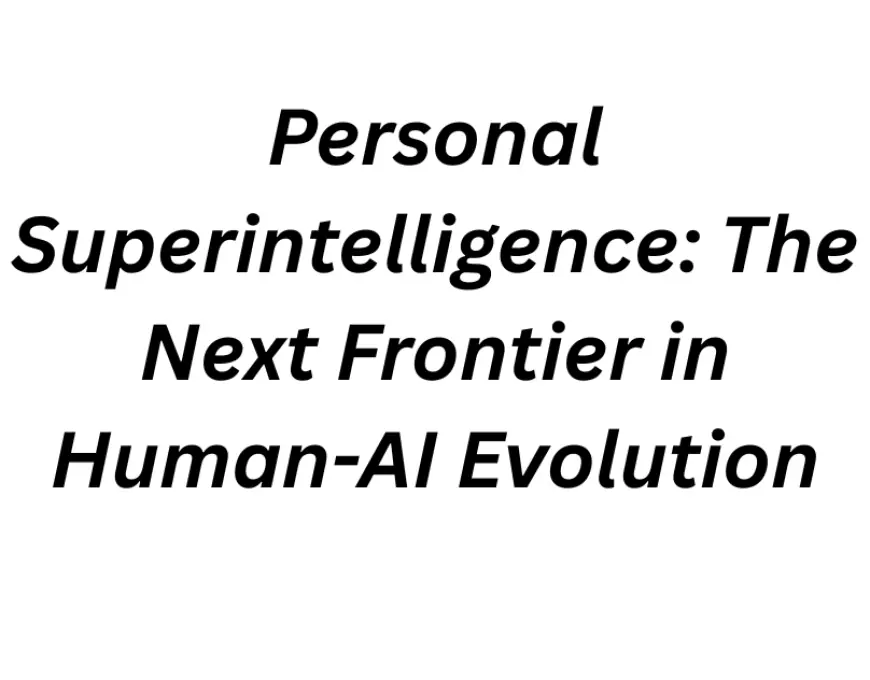Personal Superintelligence: The Next Frontier in Human-AI Evolution
Explore the concept of personal superintelligence—how AI could amplify individual human intelligence and decision-making in the near future. Learn about its potential, risks, and real-world applications.

What Is Personal Superintelligence?
Personal superintelligence refers to the integration of advanced artificial intelligence with individual human minds, aiming to vastly amplify personal cognitive capacity, decision-making, memory, and creativity. While general artificial superintelligence (ASI) focuses on machines surpassing human intelligence, personal superintelligence centers on empowering one person at a time an AI system tailored specifically to your goals, context, and thought patterns.
Imagine having a virtual co-pilot that not only understands your habits and preferences but also continuously learns, predicts, and enhances your decision-making in real-time. That’s personal superintelligence.
How Does It Work?
At the core, personal superintelligence combines:
-
Machine learning algorithms that analyze your behavioral patterns, preferences, and cognitive style
-
Natural language interfaces that let you communicate with AI as naturally as talking to a friend
-
Memory integration tools that track and recall personal data far beyond human memory
-
Contextual intelligence, enabling the system to make recommendations or predictions based on real-life situations and emotions
Some examples include:
-
An AI assistant that manages your calendar, health, finances, and emails with near-perfect accuracy
-
A decision-support system that helps you weigh risks, understand outcomes, and stay on track toward goals
-
A creativity booster that suggests innovative solutions based on your previous work and global databases
Why Is Personal Superintelligence Important?
In an age where data overload, stress, and complexity are rising, personal superintelligence offers the most scalable solution for cognitive empowerment.
Key benefits include:
-
Enhanced productivity
You can automate repetitive decisions and focus on high-value thinking. -
Stronger decision-making
With predictive models, your AI assistant can warn you about emotional bias or risky choices. -
Customized learning
The system helps you learn faster by tailoring information flow to your retention style. -
Long-term memory extension
You’ll never forget a meeting, name, or fact again your AI logs and organizes it all.
Real-World Examples
-
Rewind.ai and Humane AI Pin are early attempts to create memory-augmenting, always-on assistants.
-
Elon Musk’s Neuralink aims to directly link AI with the human brain through brain-computer interfaces.
-
OpenAI and Anthropic are building personal copilots that understand not just text but intent, tone, and personal context.
Risks and Ethical Considerations
While personal superintelligence sounds exciting, it also raises concerns:
-
Privacy: Who owns the data? If your AI knows everything about you, misuse could be catastrophic.
-
Dependency: Over-reliance could weaken human critical thinking over time.
-
Bias amplification: If AI is trained on biased data, it may reinforce flawed beliefs or actions.
-
Security threats: AI systems with deep access to your life are vulnerable to hacking or manipulation.
As personal AI systems become more autonomous and deeply embedded in human life, regulations and ethical frameworks must evolve to ensure safety and fairness.
The Future of Personal Superintelligence
By 2030, personal superintelligence may become as common as smartphones. Individuals will likely carry or wear intelligent agents that can:
-
Detect mood changes
-
Coach them through decision-making
-
Automate personal finances
-
Create content, presentations, or code on demand
-
Engage in meaningful dialogue
But beyond productivity, the deeper potential lies in self-actualization AI helping you become the best version of yourself by constantly refining your habits, values, and purpose.
Final Thoughts
Personal superintelligence isn’t just a sci-fi fantasy anymore it’s an emerging technology with the power to redefine how we live, think, and grow. As the race for AI development accelerates, the idea of having a “second brain” isn’t just desirable it may soon be essential to compete and thrive in a complex digital world.
But with great power comes great responsibility. Building a future where personal superintelligence benefits everyone—not just a privileged few will require ethical innovation, transparent design, and human-centered goals.
What's Your Reaction?
 Like
0
Like
0
 Dislike
0
Dislike
0
 Love
0
Love
0
 Funny
0
Funny
0
 Angry
0
Angry
0
 Sad
0
Sad
0
 Wow
0
Wow
0


















































